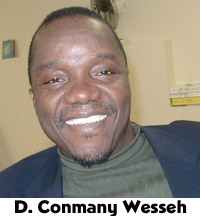 independence
day. A Town Hall Panel Discussion with the theme "Settling
Our Liberian Palaver: In Search of a New Vision" is sheduled
for Saturday, July 28, at 9:00 am at the Auburn Ave Library.
independence
day. A Town Hall Panel Discussion with the theme "Settling
Our Liberian Palaver: In Search of a New Vision" is sheduled
for Saturday, July 28, at 9:00 am at the Auburn Ave Library.LAMA Plans Independence Day Activities
The Perspective
July 17, 2001
ATLANTA, GEORGIA - As Liberia continues to remain embroiled
in crisis and caught in the throes of stagnancy, Liberians in
the Diaspora continue to maintain a tradition of commemorating
their country's independence day in spite of the fact that there
is nothing to celebrate about. Like many Liberian Communities
across the US, the Liberian Association of Metropolitan Atlanta
(LAMA), a member chapter of the Union of Liberian Associations
in the Americas (ULAA), is planning a series of activities to
commemorate Liberia's 154th Independence anniversary, which is
officially celebrated on July 26 each year. As a long cherished
tradition, the community plans to host a weekend of meaningful
activities befitting the commemoration of Liberia's  independence
day. A Town Hall Panel Discussion with the theme "Settling
Our Liberian Palaver: In Search of a New Vision" is sheduled
for Saturday, July 28, at 9:00 am at the Auburn Ave Library.
independence
day. A Town Hall Panel Discussion with the theme "Settling
Our Liberian Palaver: In Search of a New Vision" is sheduled
for Saturday, July 28, at 9:00 am at the Auburn Ave Library.
In a press release issued by the President of LAMA, Ms. Christiana Dagadu, "the association has planned activities to bring the Liberian community together in a spirit of celebration and fellowship," she said. According to the release, the celebration will commence on Thursday, July 26, with a commemorative ceremony at the Vision of Faith African United Methodist Church (AUMC). This event will lift off the occasion, and is expected to turn out Liberians residing in the metro area estimated to be around five thousand. Other Liberians from neighboring states such as Alabama, South and North Carolinas and Tennessee, are expected to attend as well.
A diverse panel of Liberians has been invited to discuss the Liberian crisis in an "interactive exchange with the Liberian community, and recommend solutions that can form the basis for the development of a new vision for a better Liberia." According to the organizers of the panel, the choice of the key word, 'palaver' in the theme is guided by a time-tested tradition in Liberia's past. That tradition is "consensus-building." Palaver is derived from the Portuguese word, "palavra," meaning speech or talk. The word originated with Portuguese traders on the West Coast of Africa from about 16th century. They were often frustrated and disgusted with African chiefs for always 'talking and talking' about every seemingly irrelevant detail. The Portuguese considered all the talk a useless waste of time. They disparaged this African tradition as meaningless. The word "palaver" eventually came to represent what they saw as a useless and protracted discussion.
 However, what the Portuguese did
not know or failed to recognize is that "the endless talk"
was intended to find a common solution, a consensus to issues
(whether small or complex). The organizers call attention to this
significant part of our African past. They convene this palaver
in the true spirit of the African tradition. The organizers are
however, very mindful that our present ruler makes a mockery of
this 'consensus-building' process by using it as a ploy to actually
avoid reaching an agreement that could bring an end to the suffering
of our people. He often unshamefully says, 'we will talk and talk
and agree to talk again.' The organizers denounce this travesty
and instead enjoin the Panel to sincerely search for a way to
end the destruction and daily oppression at home.
However, what the Portuguese did
not know or failed to recognize is that "the endless talk"
was intended to find a common solution, a consensus to issues
(whether small or complex). The organizers call attention to this
significant part of our African past. They convene this palaver
in the true spirit of the African tradition. The organizers are
however, very mindful that our present ruler makes a mockery of
this 'consensus-building' process by using it as a ploy to actually
avoid reaching an agreement that could bring an end to the suffering
of our people. He often unshamefully says, 'we will talk and talk
and agree to talk again.' The organizers denounce this travesty
and instead enjoin the Panel to sincerely search for a way to
end the destruction and daily oppression at home.
 Among those invited to participate
in the Town Hall meeting are: Rev. Canon Burgess Carr, formerly
of the All African Conference of Churches (ACCC); Dr. Sakui W.
G. Malakpa, A Liberian educator , of the University of Toledo;
Mr. D. Conmany Wesseh, Executive Director, Center for Democratic
Empowerment (CEDE), Liberia; Hon. William Bull, Liberian Ambassador
to the United States; Mr. Mathu H. Gibson, Liberia Contemporees
United Patriotic & Strong; and Dr. Marcus Dahn, Movement for
Democratic Change in Liberia (MDCL).
Among those invited to participate
in the Town Hall meeting are: Rev. Canon Burgess Carr, formerly
of the All African Conference of Churches (ACCC); Dr. Sakui W.
G. Malakpa, A Liberian educator , of the University of Toledo;
Mr. D. Conmany Wesseh, Executive Director, Center for Democratic
Empowerment (CEDE), Liberia; Hon. William Bull, Liberian Ambassador
to the United States; Mr. Mathu H. Gibson, Liberia Contemporees
United Patriotic & Strong; and Dr. Marcus Dahn, Movement for
Democratic Change in Liberia (MDCL).
The day's events will be climaxed by sporting activities and Independence Day Ball. According to Ms. Dagadu, proceeds generated from the events "will be used to support the education of Liberian children."